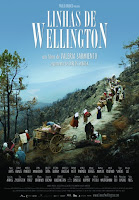Torres
Vedras was not exactly Waterloo, but don’t tell the Portuguese that. It was there Gen. Wellington and the combined
British and Portuguese troops he commanded defeated Napoleon’s invading army
behind secretly commissioned fortifications.
An epic campaign that still resonates on the Iberian Peninsula, Wellington’s
military sojourn in Portugal was perfect fodder for a grandly sweeping Raúl
Ruiz film, but it was not to be. Passing
away during a stage of either late development or early pre-production, Ruiz’s
widow Valeria Sarmiento stepped into the master’s shoes, helming Lines of Wellington (trailer here), which screens
during the 50th New York Film Festival.
Wellington
has just shocked the French with tide turning victory at Buçaco, yet he is
retreating anyway. Despite the
demoralized state of the Bonaparte forces, they simply have an overwhelming
numerical advantage. The British and
their Portuguese allies will dig in behind the Torres Vedras ramparts, letting
time fight the battle for them.
This
is classic Nineteenth Century warfare, attracting spectators and
hanger-ons. For British evacuee Clarissa
Warren, it is the perfect opportunity to find an officer-grade husband. The distinguished Major Jonathan Foster looks
like a good candidate, but he is not necessarily in the market for a trophy
wife. Wounded soldiers will recuperate,
romances will blossom, combatants will ravage the local populace, and spies
will be dealt with. Yet, the real story
for LOW’s domestic audience is scorched
earth damaged wrought by the French and British on their native land.
Condensed
from a longer Portuguese miniseries for the international festival circuit, a
la Ruiz’s brilliant Mysteries of Lisbon,
LOW is a rangy narrative, featuring scores
of prestigious cast members, entering and exiting in maddeningly quick succession. Unlike Mysteries,
viewers will definitely feel like there are holes in LOW, at least in its current festival edit. There are numerous promising subplots here,
including Foster’s relationship with the rather forward Warren. Yet, after being introduced early on, they
disappear from film until the closing scenes.
Likewise, when Chiara Mastroianni appears as Hussar, sort of a
Bonapartist Emma Peel, it looks like a promising development, but her mere
seconds of screen time do not appreciably advance the story.
The
only characters getting a puncher’s chance at development are the General
himself and Francisco Xavier, a dispossessed farmer now serving as a Sergeant
in Wellington’s Portuguese auxiliary and as the film’s primary POV character. Fortunately, Nuno Lopes has the right rugged,
world-weary presence as the disillusion soldier, while John Malkovich chews the
scenery like an old pro as the British commander.
LOW definitely has
its moments, including a genuinely moving conclusion. Not intended as an action movie, it
powerfully recreates the aftermath of battle, rather than the actual warfighting. Yet, one wishes it had delved more deeply
into the strategic chess game in play, particularly Wellington’s penchant for
strategic retreats, which suggest he might have learned something from a
certain General Washington.
Even
at one hundred fifty-one minutes, there still seems to be something missing
from LOW. It has plenty of the elements to satisfy fans
of historical costume drama, but the Around
the World in Eighty Days style cameos from the likes of Michel Piccoli,
Isabelle Huppert, Catherine Deneuve, and Mathieu Almaric are more frustrating
than satisfying. Laudably ambitious, Lines of Wellington is ultimately more
notable for what it represents than as a self-contained film. Nonetheless, interested viewers ought to
satisfy their curiosity, because they may not have many opportunities to see LOW in any form. It sceens this Monday (10/8) and Tuesday
(10/9) as a main slate selection of the 2012 New York Film Festival.

